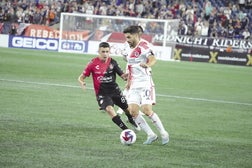
Q&A With Holy Cross President Rev. Philip L. Boroughs
 PHOTO/MATT VOLPINI
Rev. Philip L. Boroughs, S.J., President, College of the Holy Cross, Worcester
PHOTO/MATT VOLPINI
Rev. Philip L. Boroughs, S.J., President, College of the Holy Cross, Worcester

In the 14 months since he became the 32nd president of Holy Cross, Rev. Philip Boroughs has seen the largest donation to the school in its 170-year history ($25 million, from 1956 alumnus Cornelius B. Prior Jr.), has helped strengthen ties to the Worcester area, and, on a broader scale, witnessed changes in the higher education industry and their potential impact on Holy Cross. He addressed those issues, and others, in an interview last week.
In your first report as president, you addressed the importance of spiritual retreats for students and faculty. How much of a difference can a retreat make today in the life of your typical college student, whether he or she attends Holy Cross or not?
Retreats can become an important centering experience for students in a highly fast-paced environment that uses technology in so many different ways, and we're always connected. It can help us to slow down, to be reflective.
The cost of educating a college student today is under heavy scrutiny. What can schools such as Holy Cross do to help make the costs more reasonable?
We are one of the fewer than 50 "need-blind" … colleges and universities in the United States. When we accept students to Holy Cross, we do not look at their financial need statements. And after we've accepted them and students have made the choice to come to Holy Cross, we work with them … to meet 100 percent of that need. This current year, we have committed $41.2 million in financial aid to students. Any student in Worcester who is able to get in and meet our academic standards whose family makes less than $50,000 a year comes to Holy Cross tuition free.
Holy Cross is more renowned for teaching liberal arts, yet many of its students have gone on to lead businesses, especially in the Worcester area. What does that say to you about the value of a Holy Cross degree today?
It is true the academic standards have improved enormously. But I think the genius of the liberal arts curriculum is that it focuses the student on learning to think critically and to write effectively and to speak sensitively, so that the skillsets that they learn will endure for a lifetime of careers.
Much has been written about high schools graduating smaller classes over the next few years. How is Holy Cross prepared to deal with a possibly reduced number of students coming through the pipeline?
Interestingly, the last three years in a row have probably been our three highest years for applicants coming to Holy Cross. I've been very concerned here that we look where our students are coming from and adding diversity both in terms of the South and the West, but also internationally; how can we attract the best students to create an experience here that's diverse economically, racially, geographically and culturally. We're now more diverse than we've ever been in our history.
Holy Cross athletics used to be the closest thing to a “big-time” sports program for the Worcester area. Do you see the pendulum swinging the other way?
We have to look again at the role that athletics plays at Holy Cross and we have to continue to consider other resources we put toward athletics and the role it plays within the liberal arts and higher education. We're not going to compromise our academic standards and, I hope, our athletic ethics. But we can continue to look at what continues to produce the best possible experience for our students, what brings satisfaction and joy to our alums, and how this can fit together in the mission we have.
You've been in your role for more than a year now. What have you learned?
One of the things that's most unique about Holy Cross is the quality and the commitment of our alums. I'm amazed at their dedication and the commitment they've made to support and sustain Holy Cross not only through their generous financial contributions but also through their mentoring, through research opportunities, through internships. But probably at the heart of our experience on our campus is the relationship between faculty and students. Our faculty go way above and beyond normal expectations in terms of their engagement with our students.
Video
Shop Talk - Rev. Philip L. Boroughs, College of the Holy Cross
Read more
Endowments Mixed At Area Colleges
Holy Cross Grad Makes $25M Donation
Q&A With Michael Hanley of FMG Financial Services
Q&A With Richard A. McGrath, McGrath Insurance Group













0 Comments